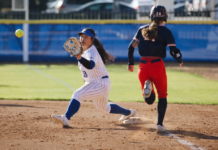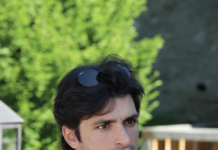
Nate Browne, assistant cross country and track and field coach, serves those roles full-time throughout both respective sport seasons. However, Browne also holds another important role in both programs as a recruiting coordinator.
It is a tough job replacing graduating seniors to bring in new, young talent. In the first week of June this year, both Browne and fellow assistant track and field coach Andrew Basler attended the CIF-State Track and Field Championships in Clovis, CA to scout potential UCR recruits.
Browne coordinates for both cross country and track, which keeps him busy throughout the year, recruiting talent to come and compete at UCR. Browne commented, “Due to both sports, there isn’t really a downtime to my position. I’m either recruiting athletes, planning or getting ready to recruit student athletes.”
Browne identifies a prospective athletic candidate for recruitment mostly by word of mouth, from fellow coaches and former athletes. From that point, Browne would conduct a “eye test,” to gauge the potential of an athlete, along with their personality.
“We have some that we pursue, some that are referred by their coaches and alumni and some that start the process because they reach out to us. I rely on the “eye test” as much as possible. I want to see how they compete and what they look like doing it. This will tell me a lot about what their potential is. Then by meeting them I can determine if they’ll fit in well with our school and team. We don’t just recruit times and marks—we recruit people. If they are the right fit the times and marks will follow, like it has in so many cases of current and past track athletes,” said Browne.
Once Coach Browne decides on an individual he is interested in recruiting, a long process begins. “Generally it starts with phone calls. That allows me to vet the prospective student athletes and see if the fit might be right. Then a campus visit is involved after we watch them compete. Then we’ll decide if we’re making an offer of scholarship or if they’ll be a walk on athlete. Then it’s up to them,” explained Browne.
Scholarships are only given to some athletes due to NCAA constraints and funding issues. The financial aid office and Coach Browne have to work together on assembling a attractive financial aid package.
“We have to make our scholarship funding stretch as best we can. The NCAA maximum is 12.6 full scholarships for men and 18 full scholarships for women—however we are funded at less than 50 percent of these limits so we have to award partials and partner our resources with financial aid to make financial packages that are attractive to recruits,” said Browne.
The main selling point for an athlete to come to UCR is its diversity, which according to Coach Browne, makes athletes feel more comfortable. “We are a literal United Nations as a campus and as a team,” said Browne.
Location is another key selling point for local athletes, as Coach Browne explained, “It gives them an opportunity to have their family and friends share in their athletic and educational experience.”
With the new track stadium, Coach Browne is able to take potential recruits as the first place when starting a campus tour. Before the new track was constructed it was the last.
“There is so much to like about UCR—people think they know what it’s like before they get to campus but love what they see and experience afterwards,” said Browne.







